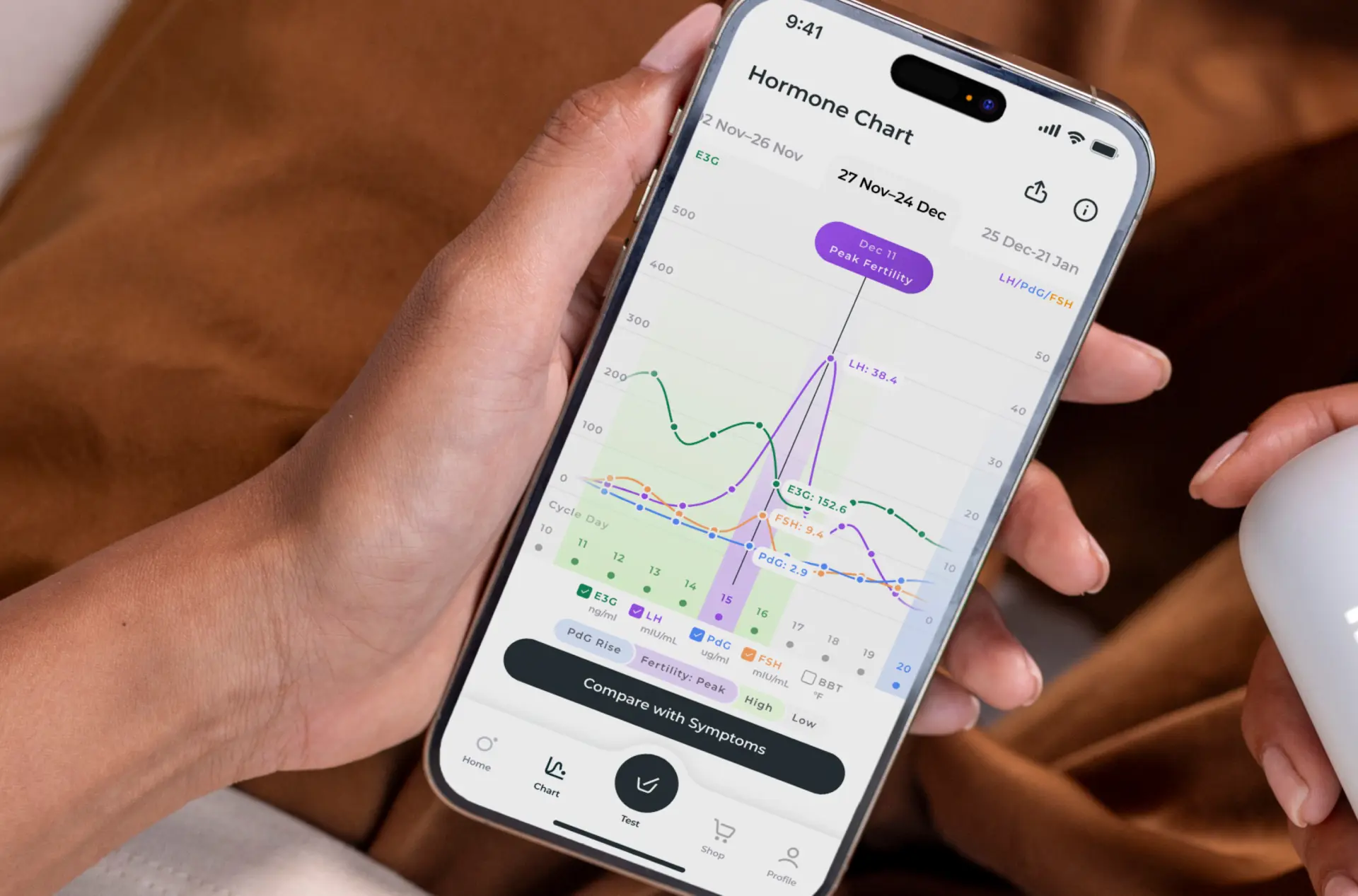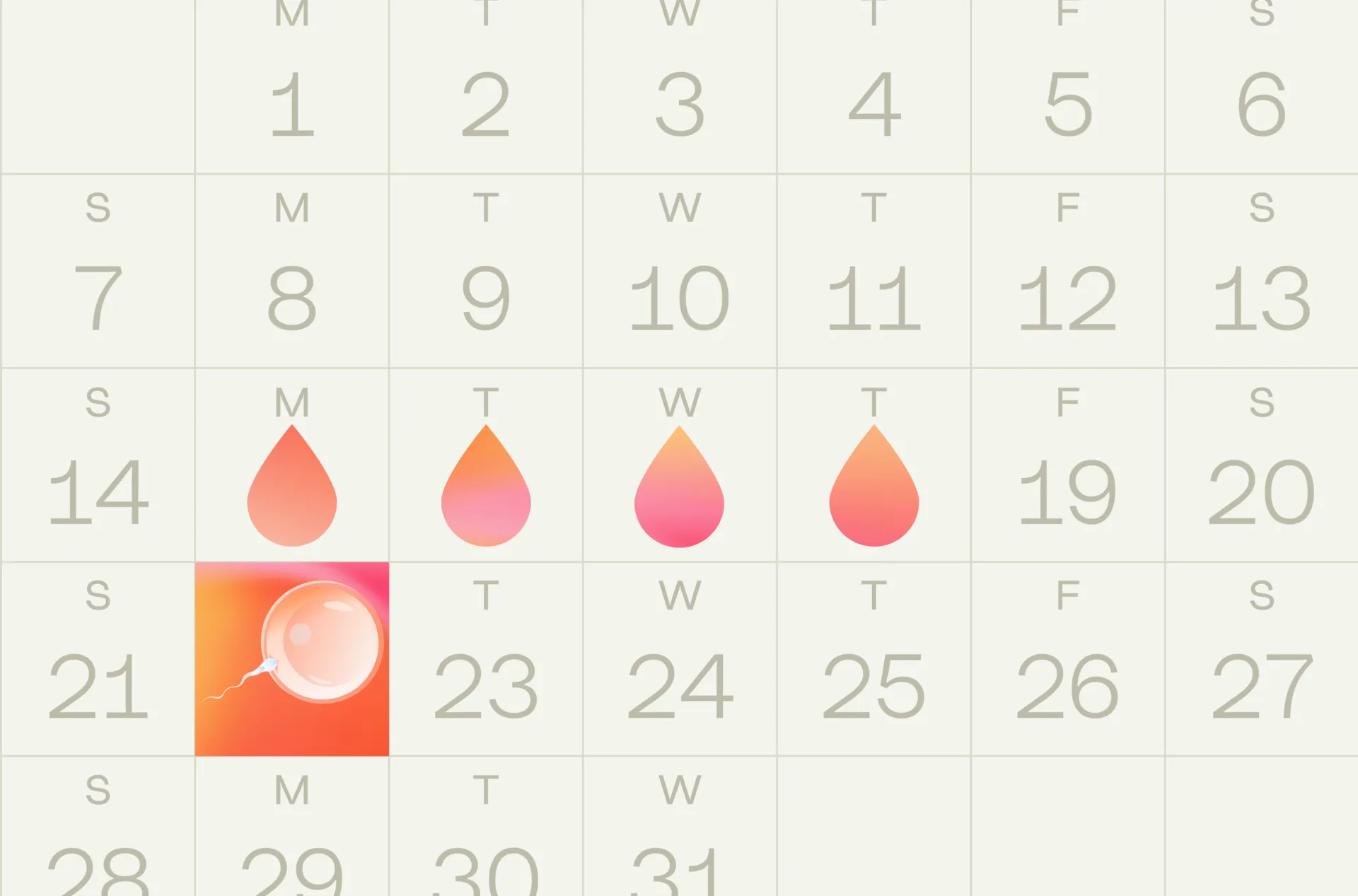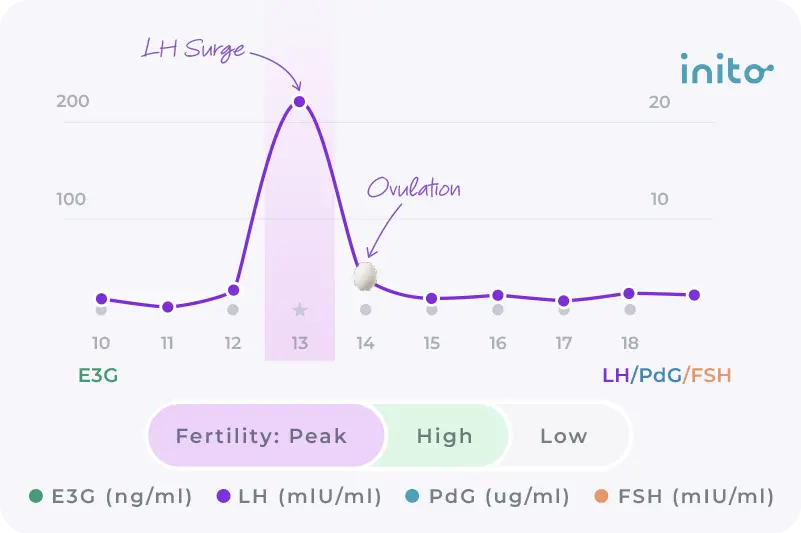Content table
Are you dealing with low progesterone? Chances are, your doctor has suggested progesterone supplements to help.
But before you dive into taking the supplements, it’s important to consider the side effects.
While most of these are minor, some may make you feel seriously uncomfortable and require a chat with your doctor.
Read on to learn more about those progesterone side effects and what you can do about them.
Key Takeaways
- Progesterone is essential for reproduction.
- It is involved in functions such as thickening and maintaining the uterine lining, preventing miscarriage and preterm labor, breast milk production, and supporting the immune system during pregnancy.
- Progesterone also affects the nervous system, digestive system, and fluid regulation.
- There are a few different types of progesterone supplements: pills, injections, suppositories, vaginal gels, and topical creams.
- General side effects of progesterone include headaches, fatigue, mood swings, bloating, irregular bowel movements, breast tenderness, and more.
- Oral progesterone supplements may affect your body the most intensely because the pills undergoes extensive metabolism in the liver, leading to multiple side effects.
- Progesterone injections can cause pain, inflammation, lumps, or swelling at the site of the injection.
- Vaginal supplementation may cause adverse reactions such as irritation, discomfort, and white discharge.
- Topical creams have less common adverse reactions due to variable skin absorption.
- It’s important to always talk to a healthcare professional before starting any progesterone supplements.
- If you have any sort of allergic reaction or experience vomiting, vaginal bleeding, excessive tiredness, or abdominal pain, seek medical attention from a healthcare professional immediately.
What Is the Role of Progesterone?
Progesterone is one of our favorite topics because it is one of the biggest stars of reproduction. It is made by the corpus luteum, placenta, and adrenal glands.
What does progesterone do?
Here’s a highlight reel:
- It thickens your uterine lining post-ovulation in order to properly feed and care for your fertilized egg.
- It reduces muscle contractions in your uterus that could put your implantation success at risk.
- It prevents ovulation, so you can’t get pregnant again while you’re already pregnant.
- It protects your immune system from rejecting the fetus.
- It boosts the development of breast tissue and helps prep your breasts for milk production and breastfeeding.
All of these feel pretty important, right?
But wait, there’s more.
Progesterone does more than just run your reproduction – it is also vital to a variety of bodily functions, which is why adding progesterone supplements to the mix can cause a slew of side effects (more on that later).
What Are the Different Types of Progesterone Supplements?
Thanks to modern medicine, you’ve got options when it comes to progesterone supplements.
You can choose from pills, injections, suppositories or vaginal gels, and creams.
See how your hormone chart might look like!
Answer some questions to help us provide you a free personalized hormone chart customized to your hormonal health and conditions
What Are the Most Common Side Effects of Progesterone Supplements?
It’s essential to always be aware of a drug’s potential adverse reactions before adding it to your regimen. Let’s discuss the general side effects of progesterone supplements first.
Let’s start with the general side effects of progesterone supplements, and then we’ll get more specific with each type.
Generally speaking, you may see the following side effects occur from progesterone supplements:
- Severe headache
- Fatigue
- Drowsiness
- Mood swings
- Depression
- Sleep problems
- Bloating
- Abdominal pain
- Cramps
- Altered bowel movements
- Enlarged breasts
- Breast tenderness
- Fluid retention/swelling
- Loss of sex drive
But if progesterone is involved in your reproductive system, then why would you experience things like mood swings and bloating by taking supplements?
Well, that’s because progesterone is also key to your nervous system, digestive system, and body fluid regulation. Let’s understand how.
Nervous system
This may be news, but progesterone affects your mood, sense of well-being, and alertness.
That’s because a metabolite of progesterone (allopregnanolone) binds to GABA-A receptors in your brain and boosts GABA function.
What’s GABA? It’s a neurotransmitter in your brain that’s kind of like nature’s Xanax, thanks to its calming effect. However, if you have too much GABA, you can experience mood swings, anxiety, drowsiness, and sleep disturbances.
Digestive system
Did you know that progesterone helps with smooth movements in your digestion?
That’s because this hormone affects the muscles in your digestive tract, causing them to relax. But too much progesterone can lead to abdominal discomfort and even constipation.
Body fluid retention
Progesterone helps regulate body fluids, so when your progesterone levels are low, you may struggle with fluid retention, which can manifest as bloating, weight gain, and leg swelling.
Now that you see why your seemingly unrelated symptoms are actually very related, let’s go into the specifics of progesterone supplements and their side effects.
What Are the Most Common Side Effects of Progesterone Supplements?
Here are the various types of progesterone supplements that your doctor might prescribe and their side effects:
Oral progesterone side effects
Oral progesterone is probably the most well-known form of progesterone supplements, but there’s a pretty major downside—they come with the most intense side effects.
Why?
Because once it’s ingested, it doesn’t go straight into the bloodstream. Since it’s a pill, it first has to pass through your liver, where it gets metabolized (called first-pass metabolism).
To account for this extra stop on the journey, you have to take higher doses of progesterone when it’s in pill form. A higher dose means more side effects.
Oral progesterone also gives rise to metabolites that, like the above, have their own army of adverse reactions. They also bind with the progesterone receptors and affect absorption.
These effects are quite severe and are a defining factor in the reason why oral progesterone is non-compliant with progesterone therapy.
To add to that, the synthetic variety of progesterone pills can cause liver damage, fatigue, and dizziness.
Know More: Oral Progesterone and Pregnancy? What You Should Know
Progesterone injection side effects
As is the case with any injection, one of the biggest issues you’re going to see is reaction at the injection site – ouch!
Progesterone injections are suspended in a thick oil, and you know what that means? A big, thick needle that doesn’t feel great going in. This can cause pain and other reactions at the site, including
- Panniculitis or inflammation of the subcutaneous fat
- Lumps or swelling
- Sterile abscess
Know More: Progesterone Injections: Who, What, When, Where, Why, and How
Vaginal progesterone side effects
This form of progesterone supplements includes vaginal gels and suppositories. They have fewer side effects because they have a greater local effect on the endometrium. But it can cause vaginal irritation and discomfort and also give rise to white discharge.
The discharge is heaviest right after you insert the progesterone, and if it feels like a lot, opt to wear a light pad. If you’re worried about the amount of discharge, talk to your doctor. They may suggest lowering your dosage, switching the brand or progesterone type, and ensuring that you’re using the suppository right.
Know More: Progesterone Suppositories: The Ultimate How-To Guide!
Topical progesterone cream side effects
Topical progesterone creams are mainly used to treat menopause symptoms. They have a few side effects, but these tend to be less than those of other options because absorption via the skin varies from person to person.
Progesterone can cause skin irritation and affect hair follicle growth, leading to:
- Inflammatory lesions
- Facial hair
- Facial pigmentation
How Can I Reduce the Side Effects of Progesterone?
Here are a few tips on how to reduce progesterone side effects.
- Don’t take any progesterone supplements (even OTC ones) until you’ve talked to your doctor.
- Let your healthcare professional know of any allergies to progesterone, birth control, hormone replacement therapy, etc.
- Tell your doctor about any and all health issues in your past – we are talking about everything from migraines to depression to liver diseases to miscarriage to vaginal bleeding to breast cancer and beyond.
- If you and your doctor are looking at the progesterone injection route, make sure you aren’t allergic to seeds or nuts! These injections are suspended in sesame, peanut, or a similar type of oil.
- Fill your healthcare professional in on any drugs or supplements you’re taking (that includes vitamins, herbal supplements, nutritional supplements, and more).
- Read the instructions and always take your meds according to the package instructions.
- If you accidentally miss a dose, take it ASAP. But if it’s almost time for your next dose, don’t double-dose to account for your missed dose.
- If you are experiencing any discomfort with your current treatment, call your doctor and talk to them about other options.
When Do I Need to See a Doctor?
If you started a progesterone supplement routine and things feel off, don’t wait until it’s too late – schedule an appointment with your healthcare professional immediately.
Here are some adverse reactions that mean you should call your doctor for medical advice ASAP:
- Severe allergic reaction (hives, itching, wheezing, breathlessness, fainting)
- Vaginal bleeding
- Excessive tiredness or drowsiness
- Depression
- Severe vomiting
- Severe abdominal pain

FAQs
Progesterone plays an important role in men too! It acts as a precursor to testosterone and also helps in sperm production. On top of that, it helps counteract the effect of estrogen.
If you’re a male experiencing progesterone imbalance, you may feel:
- Decreased libido
- Weight gain
- Erectile dysfunction
- Gynaecomastia
- Mood changes
- Anxiety
- Depression
Too much progesterone in the system can lead to severe headaches, fatigue, drowsiness, irregular cycles, fertility issues, acne, mood swings, depression, sleep problems, bloating, abdominal pain, cramps, irregular bowel movements, enlarged and painful breasts, fluid retention, and loss of libido.
Different progesterone supplements can cause additional side effects, including liver damage, lumps, swelling, white discharge, facial pigmentation, and more.
Be sure to talk to your doctor about the options for progesterone supplements and which one is best for you.
Read more: How Does Too Much Progesterone Affect Fertility and Pregnancy?
Though we can’t point the finger directly at progesterone for weight gain, we can confirm that changes in your progesterone levels can cause you to gain weight.
That’s because progesterone interacts with other hormones (we’re looking at you, estrogen) to keep your body balanced. If estrogen is high, progesterone is low. If estrogen is low, progesterone is high.
They help each other out unless there is a shortage of progesterone – then that balance is thrown off, and estrogen starts to dominate. This estrogen dominance can lead to shifts in how much fat we store in our bodies.
Read more: Does Progesterone Cause Weight Gain?
What are the benefits of taking progesterone?
- Low progesterone can manifest as
- Low libido
- Irregular menstrual cycle
- Abnormal uterine bleeding
- Fertility issues
- Miscarriages
- Ectopic pregnancy
If any of these sound like you, then you stand to benefit from taking progesterone to get your reproductive system back on track, especially if you’re trying to get pregnant.
Know More: Low progesterone: All you need to know
Progesterone affects not just your reproductive system but also your nervous system. It can increase the amount of GABA in your body, which can lead to moodiness, irritability, sleep issues, and even depression.
If you’re feeling some of those negative side effects, it may be because your dose or mode of supplementation is not ideal for your specific body.
Work with your doctor to adjust your progesterone dose and type.
Steer clear of progesterone if you’re allergic to progesterone or birth control, if you have undiagnosed vaginal bleeding, liver disease, a history of cancer, and/or depression.
Was this article helpful?
- Physiology, Progesterone | NIH
- Efficacy and tolerability of vaginal progesterone capsules (Utrogest™ 200) compared with progesterone gel (Crinone™ 8%) for luteal phase support during assisted reproduction | ASRM
- Effect of progesterone on the expression of GABA(A) receptor subunits in the prefrontal cortex of rats: implications of sex differences and brain hemisphere | NIH
- Progesterone Inhibitory Role on Gastrointestinal Motility | NIH
- Estrogen to Progesterone Ratio and Fluid Regulatory Responses to Varying Degrees and Methods of Dehydration | Frontiers
- Oral versus intramuscular progesterone for in vitro fertilization: a prospective randomized study | ASRM
- Natural vaginal progesterone is associated with minimal psychological side effects: a preliminary study | NIH
- Comparison between different routes of progesterone administration as luteal phase support in infertility treatments | Oxford Academic
- Panniculitis caused by progesterone injection can be treated by physical therapy | Wiley Online Library
- Natural vaginal progesterone is associated with minimal psychological side effects: a preliminary study | NIH
- High local endometrial effect of vaginal progesterone gel | NIH
- Hormonal Effects on Hair Follicles | NIH
- Estrogen: The necessary evil for human health, and ways to tame it | NIH












